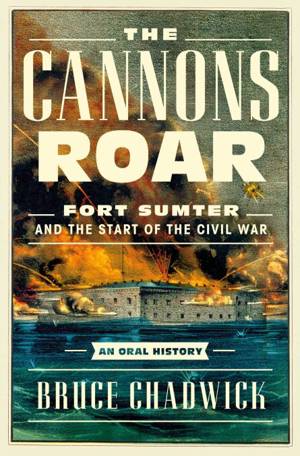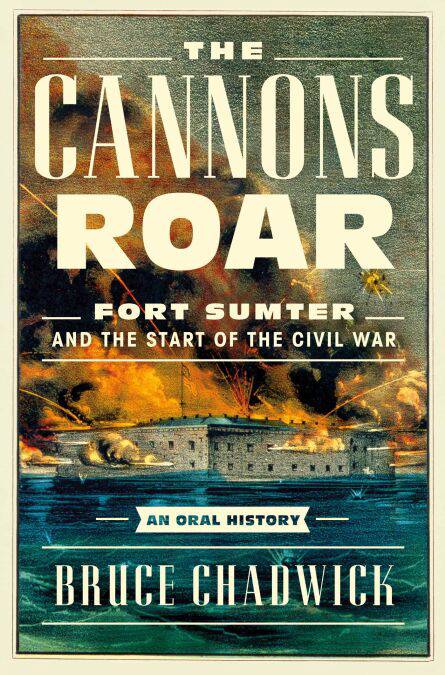
- Retrait gratuit dans votre magasin Club
- 7.000.000 titres dans notre catalogue
- Payer en toute sécurité
- Toujours un magasin près de chez vous
- Retrait gratuit dans votre magasin Club
- 7.000.0000 titres dans notre catalogue
- Payer en toute sécurité
- Toujours un magasin près de chez vous
The Cannons Roar EBOOK
Fort Sumter and the Start of the Civil War—An Oral History
Bruce Chadwick
Ebook | Anglais
12,29 €
+ 12 points
Format
Description
The first-ever oral history of the attack that started the Civil War that combines illuminating historical narrative with intense first-hand accounts.
On April 12, 1861, Confederate troops began firing on Fort Sumter, beginning the bloodiest conflict in American history. Since that time numerous historians have described the attack in many well-regarded books, yet the event still remains overlooked at times in the minds of the public.
The Cannons Roar seeks to remedy that. Rather than providing a third-person, after-the-fact description, acclaimed author Bruce Chadwick will tell the story of the attack from the people who were in the thick of it. In so doing, readers can hear from people themselves, telling a compelling story in a new way that both draws readers in and lets them walk away with a better understanding and appreciation of one of the most dramatic and important events in our nation’s history. The Cannons Roar will not only provide portraits of the major players that are more descriptive than those offered by historians over the years, it will give voice to dozens of regular people from across the country and socioeconomic spectrum, to provide readers with a true and complete understanding of the mood of the country and in Charleston.
Using letters, newspaper articles, diaries, journals, and other written sources, Chadwick describes in vivid detail the events preceding the attack, the attack itself, and its aftermath. While we hear from historic pillars like Abraham Lincoln to PGT Beauregard to Jefferson Davis, Chadwick also features Charleston merchants and Northern farmers, high society doyennes and “the dregs,” South Carolina’s new governor Francis Pickens, who was the blustery former Minister to Russia. Collectively, readers will obtain a fuller understanding of the politics and thinking of political and military leaders that influenced their decisions or lack thereof. The book will also capture both the South and North’s expectations regarding England entering the war (as well as letters from England’s leaders showing their reluctance to do so), as well as an expectation on both sides of a quick resolution.
Skillfully combining traditional history with the in-the-moment ethos of an oral history, The Cannons Roar to bring this historic moment in American history to new and vivid life.
On April 12, 1861, Confederate troops began firing on Fort Sumter, beginning the bloodiest conflict in American history. Since that time numerous historians have described the attack in many well-regarded books, yet the event still remains overlooked at times in the minds of the public.
The Cannons Roar seeks to remedy that. Rather than providing a third-person, after-the-fact description, acclaimed author Bruce Chadwick will tell the story of the attack from the people who were in the thick of it. In so doing, readers can hear from people themselves, telling a compelling story in a new way that both draws readers in and lets them walk away with a better understanding and appreciation of one of the most dramatic and important events in our nation’s history. The Cannons Roar will not only provide portraits of the major players that are more descriptive than those offered by historians over the years, it will give voice to dozens of regular people from across the country and socioeconomic spectrum, to provide readers with a true and complete understanding of the mood of the country and in Charleston.
Using letters, newspaper articles, diaries, journals, and other written sources, Chadwick describes in vivid detail the events preceding the attack, the attack itself, and its aftermath. While we hear from historic pillars like Abraham Lincoln to PGT Beauregard to Jefferson Davis, Chadwick also features Charleston merchants and Northern farmers, high society doyennes and “the dregs,” South Carolina’s new governor Francis Pickens, who was the blustery former Minister to Russia. Collectively, readers will obtain a fuller understanding of the politics and thinking of political and military leaders that influenced their decisions or lack thereof. The book will also capture both the South and North’s expectations regarding England entering the war (as well as letters from England’s leaders showing their reluctance to do so), as well as an expectation on both sides of a quick resolution.
Skillfully combining traditional history with the in-the-moment ethos of an oral history, The Cannons Roar to bring this historic moment in American history to new and vivid life.
Spécifications
Parties prenantes
- Auteur(s) :
- Editeur:
Contenu
- Nombre de pages :
- 416
- Langue:
- Anglais
Caractéristiques
- EAN:
- 9781639363407
- Date de parution :
- 03-04-23
- Format:
- Ebook
- Protection digitale:
- Adobe DRM
- Format numérique:
- ePub

Les avis
Nous publions uniquement les avis qui respectent les conditions requises. Consultez nos conditions pour les avis.






